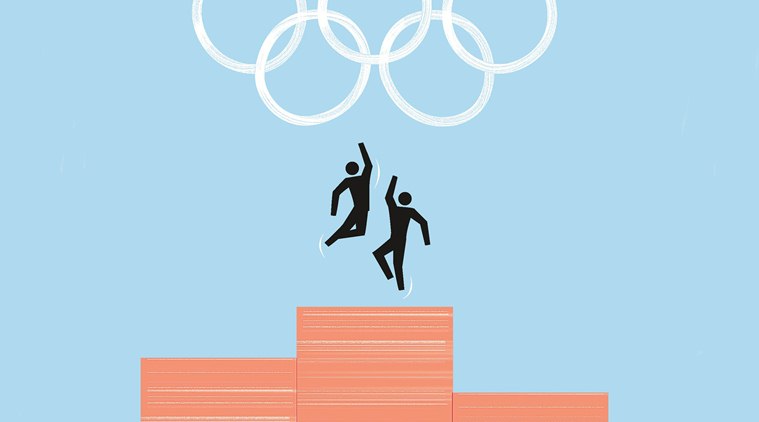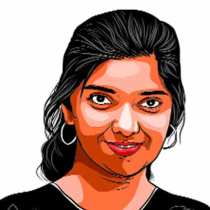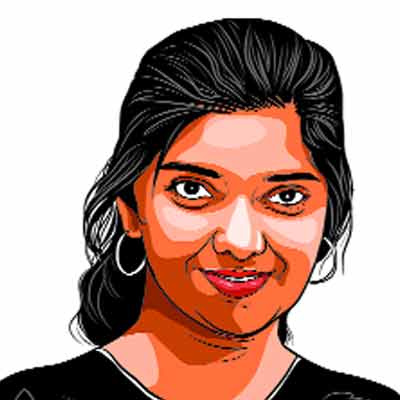Higher mountains to scale
For India’s champions at the Asian Games, the Tokyo Olympics loom large

India is working on two parallel philosophies. While it wants to promote its home-grown coaches and pay them respectable salaries — both perfectly justified — it grudges the foreign experts the money it pays them. (Illustration: CR Sasikumar)
You could wave off the shooters’ reactions — or lack thereof — as a template set by the inscrutable Abhinav Bindra or blame it on the fact that adrenaline is anathema to their job of winning medals. But Neeraj Chopra, Hima Das and Jinson Johnson, P V Sindhu and Saina Nehwal and Fouaad Mirza were also undemonstrative even though they were breaking new ground for the country at the Asian Games in Jakarta. Amit Panghal had just thrashed the Olympic champion, but he looked like he had emerged from a Vipasana session.
With a thick gold disc gleaming round the neck and the country’s media latching onto every word, it can be difficult for an athlete to make the distinction between a stepping stone and the final pedestal. National anthems are played, the flag goes up, the next day’s front page is yours and fans and celebrities on Twitter go ballistic — Dharmendra invites you to meet him. It can’t get bigger than that.
But it was refreshing how a majority of India’s Asian Games medal winners — of every hue, gold, silver or bronze — were aware that there were bigger mountains to scale, never mind how spectacular their achievements at Jakarta appeared. This included teenagers as young as 15 and 16, and Games regulars like Apurvi Chandelaand Vinesh Phogat.
The Tokyo Olympics looms large. Even before the Games wrapped up, javelin champion Neeraj Chopra had flown halfway across the globe to pit his spear scores against the best in the world in a Diamond League. And by Monday, the shooters had bagged two Olympic quotas at Changwon. And if you thought that Sindhu would sit and dwell over losing yet another final, you’d be missing her stern resolve to get to the root of the Tai Tzu Ying mystery. Nehwal, the older of the two shuttlers, continues to defy the rankings by finishing among the top four at the World Championships and Asiad. She is clear that her sights are firmly set on Tokyo.
It would be an uphill task for Hima Das and Jinson Johnson to come up to scratch at the world level in their categories. But that’s exactly what they began targeting the moment they wrapped up their Asiad races.
There’s a reason for this attitude. Fifty-odd medals in the Incheon Asian Games in 2014 were followed with just two at the Rio Olympics in 2016. After the Olympics, India’s shooting programme went through a revamp: There was an inquisition, some steps were retraced and there was upgrading in other aspects. Today, the sport is aware that an Olympics without a medal in shooting reflects on its resume when asking for funds .
Wrestling, similarly, is trying to put in place a semblance of a system for selection and scheduling. But the sport has been beset with so many missteps that you fear the petty akhada rivalries that reduced Sushil Kumar to a caricature, and made India’s only two-time Olympic medalist a highly divisive character, can affect someone like Bajrang Punia and drag him into the quagmire of politics and prejudice. The sport continues to have one foot in “parampara” and another on the modern mat. Resisting pre-Olympic trials like those in Iran, Russia, Japan and Turkey, the Indian administrators remain obstinate about professionalising a sport that has as many Olympic medals as shooting. Wrestling also needs to sort out its treatment of foreign expertise — Indian coaches grab credit when the medals come and the wrestlers are left spending their post-glory hours in trying to mollify two sets of coaches.
India is working on two parallel philosophies. While it wants to promote its home-grown coaches and pay them respectable salaries — both perfectly justified — it grudges the foreign experts the money it pays them. It refuses to share credit with these experts even though, in private, athletes swear by them. Experts who coach Olympic medalists need to be respected and not disparaged by saying that they should be happy with the fat cheques the country is signing for them. Some grace and gratitude would go a long way.
Boxing, despite Amit Panghal’s gold medal, will go down as a disappointment at Jakarta. There is, however, a coherent programme in place and the sport has earned its breathing space after the churn of the past few years.
There were landmarks for the country in badminton, but if there’s one thing the Asian Games made plain, it was that medals for the shuttlers will be far tougher to come in 2020. Many saw the prowess of Tai Tzu Ying for the first time and if Jonatan Christie could set hearts racing — not only because he changes so many shirts — you can imagine what Kento Momota could do in Tokyo. That’s besides the Chinese and Carolina Marin. If Jakarta didn’t highlight just how far behind India is in doubles, nothing else will.
Athletics, which routinely rains medals at the Asian level, needs to be the most careful. The golds lost to African imports give a fair idea of what the challenge at any global meet is likely to be.
Sailing, the sport that once boasted of the first athlete to get the Arjuna Award, Khel Ratna and Dronacharya Awards, Homi Motivala, is in a mess today. The Indian Olympic Association was arbitrary about the country’s participation in kurash and fencing and downright foolish in denying the rugby teams a chance. Pakistan was quite a hit. The basketball administrators displayed a lack of purpose by not fielding a women’s 3×3 team.
This wasn’t the first Asian Games in which India went down to Malaysia in hockey — that happened in 2010. But the sport desperately needs fresh ideas and its indulged players a strong dressing down. If they believe that they are on the right path and see the Asiad defeat as just an aberration, they couldn’t be more wrong. India needs to stop passing the buck onto coaches — Indian or foreign — especially, when players refuse to take responsibility for their performance. The angst about the losses in kabaddi, though, is misplaced. No winning streak in sport lasts forever and the overturning of tables at Jakarta was inevitable.
shivani.naik@expressindia.com
For all the latest Opinion News, download Indian Express App
More From Shivani Naik
- Asian Games 2018: Jakarta wraps up with Bollywood fusion, India with highest medal haulIt’s been that kind of Asian Games, where you caught snatches of Indonesians closing their eyes and trilling ‘Gerua’ on singing reality TV contests —…
- Asian Games 2018: Magna JakartaIndonesia, surrogate hosts after Vietnam pulled out, delivered a memorable — if not entirely perfect — Asian Games..
- Beats Olympic champion: Bobbing and weaving, Amit Panghal gets boxing goldThe Indian tends to fight firm from a lower position, and while he didn’t always lead from the inside, he got his hooks sinking into…












.png)



























No hay comentarios:
Publicar un comentario